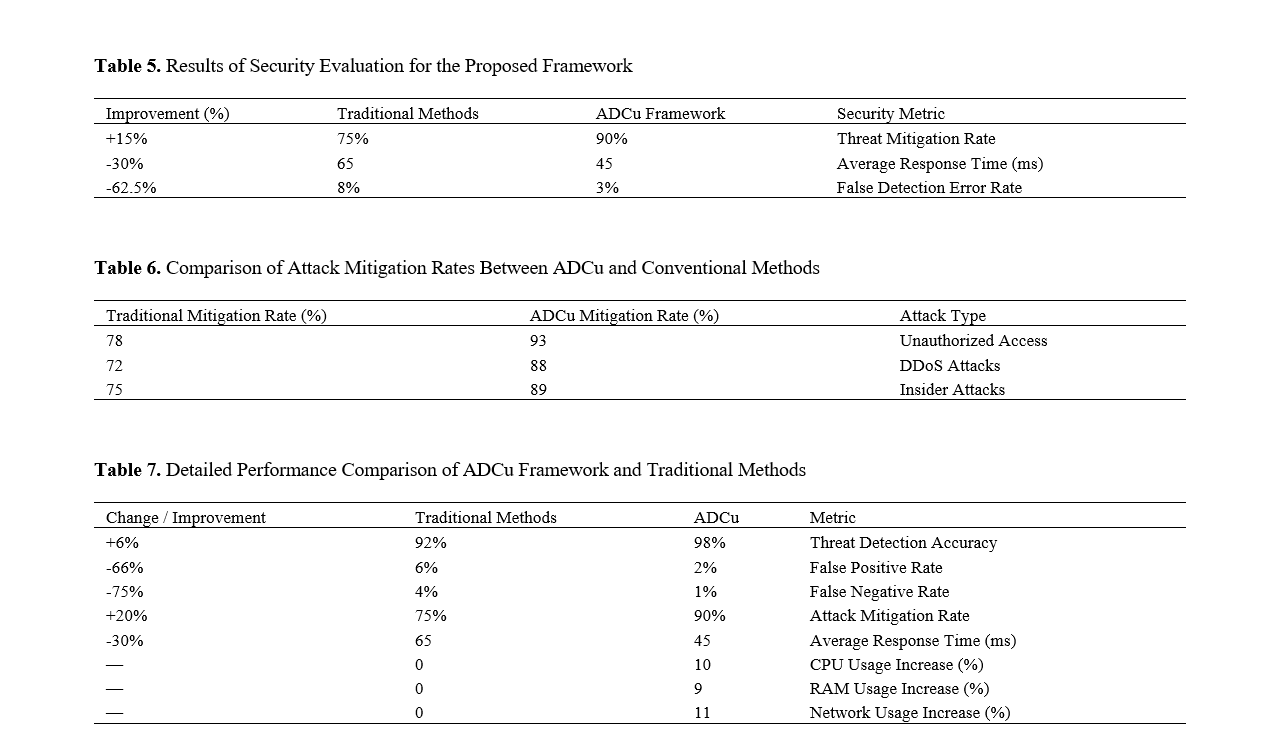An Active Data Cube (ADCu)-Based Security Framework for Enhancing Security, Access Control, and Accountability in Cloud Computing Environments
Keywords:
Cloud computing, data security, Active Data Cube (ADCu), access control, threat response, data protection, data management, active auditing, scalability, cyber threatsAbstract
Cloud computing, as a leading-edge technology, is rapidly expanding across critical sectors such as healthcare and banking due to its high scalability and flexibility. However, concerns related to data security and privacy preservation remain fundamental challenges that hinder the widespread adoption and full utilization of its benefits. This paper introduces the Active Data Cube (ADCu)-based security framework aimed at enhancing the level of security, enabling intelligent access management, and ensuring effective threat response in cloud computing environments. By integrating both active and passive data protection mechanisms, the framework comprises three core layers—core data protection, data security and control, and data operation management—offering a comprehensive and efficient structure for data monitoring, control, and protection. Laboratory evaluations, along with a case study in the healthcare domain, demonstrated that the ADCu framework can detect and mitigate over 90% of cyberattacks and improve threat response time by up to 30%. Furthermore, by incorporating active auditing and role-based access control systems, user trust and overall system security significantly increased. The findings highlight the high efficiency, scalability, and reliability of this framework, positioning it as an innovative and credible solution for data protection in cloud computing. It can serve as a scientific and practical foundation for future research and applications in this field.
References
S. Alqatan, M. Alshirah, M. B. Baker, H. Khafajeh, and S. Abuowaida, "A Conceptual Framework for the Adoption of Cloud Computing in a Higher Education Institutions," Data & Metadata, vol. 4, p. 431, 2025, doi: 10.56294/dm2025431.
D. K. H. Gopalaswamy, "AI and Human AI Collaboration in Oracle Cloud Technologies for Integration and Process Automation," European Journal of Computer Science and Information Technology, vol. 13, no. 8, pp. 107-128, 2025, doi: 10.37745/ejcsit.2013/vol13n8107128.
Y. Alshamaila, S. Papagiannidis, and F. Li, "Cloud computing adoption by SMEs in the north east of England," Journal of Enterprise Information Management, vol. 26, no. 3, pp. 250-275, 2013, doi: 10.1108/17410391311325225.
M. Azami, M. Nader Shahi, and S. N. Hosseini, "Modeling the application of cloud computing in small entrepreneurial businesses focusing on handicrafts," Journal of Entrepreneurship Education, vol. 3, no. 2, 2024.
O. S. Diahyleva, I. V. Gritsuk, O. Y. Kononova, and A. Y. Yurzhenko, "Computerized adaptive testing in educational electronic environment of maritime higher education institutions," CTE Workshop Proceedings, vol. 8, pp. 411-422, 03/19 2021, doi: 10.55056/cte.297.
A. I. A. Eid, "Sports Prediction Model Through Cloud Computing and Big Data Based on Artificial Intelligence Method," Journal of Intelligent Learning Systems and Applications, vol. 16, no. 02, pp. 53-79, 2024, doi: 10.4236/jilsa.2024.162005.
K. D. Singh, "Fog Cloud Computing and IoT Integration for AI Enabled Autonomous Systems in Robotics," Eai Endorsed Transactions on Ai and Robotics, vol. 3, 2024, doi: 10.4108/airo.3617.
X. Zhu, R. Xia, H. Zhou, S. Zhou, and H. Liu, "An Intelligent Decision System for Virtual Machine Migration Based on Specific Q-Learning," Journal of Cloud Computing Advances Systems and Applications, vol. 13, no. 1, 2024, doi: 10.1186/s13677-024-00684-y.
A. I. M. Kmaleh, "The Impact of Using the Cloud Computing Upon the Quality of Accounting Information and it's Reflection Upon the Development of the World Standards of Financial Reports in Jordanian Corporations," International Journal of Professional Business Review, vol. 8, no. 9, p. 23, 2023, doi: 10.26668/businessreview/2023.v8i9.3771.
A. B. Tello, J. Shi, D. M. D, K. K. B. M, and D. S. Sayyad, "Cloud Computing Based Network Analysis in Smart Healthcare System With Neural Network Architecture," International Journal of Communication Networks and Information Security (Ijcnis), vol. 14, no. 3, pp. 269-279, 2022, doi: 10.17762/ijcnis.v14i3.5622.
H. Hamidi and S. H. Seyed Lotfali, "Analysis of Role of Cloud Computing in Providing Internet Banking Services: Case Study Bank Melli Iran," International Journal of Engineering, vol. 35, no. 5, pp. 1082-1088, 2022, doi: 10.5829/ije.2022.35.05b.23.
L. Golightly, V. Chang, Q. A. Xu, X. Gao, and B. S. Liu, "Adoption of cloud computing as innovation in the organization," International Journal of Engineering Business Management, vol. 14, p. 18479790221093992, 2022, doi: 10.1177/18479790221093992.
S. Tajri, A. Khozin, M. Ashrafi, and J. Gorganli Doji, "Modeling the Benefits of Cloud Computing in the Accounting Profession with a Structural-Interpretive Approach," Empirical Accounting Research, vol. 12, no. 44, pp. 215-234, 2022. [Online]. Available: https://www.sid.ir/paper/1051116/fa.
R. Shkurti, "Cloud computing in accounting and digital financial reporting in Albania," 2021, doi: 10.31410/eraz.2021.199.
M. M. Sadeeq, N. M. Abdulkareem, S. R. M. Zeebaree, D. M. Ahmed, A. S. Sami, and R. R. Zebari, "IoT and Cloud Computing Issues, Challenges and Opportunities: A Review," Qubahan Academic Journal, vol. 1, no. 2, pp. 1-7, 2021, doi: 10.48161/qaj.v1n2a36.

Downloads
Published
Submitted
Revised
Accepted
Issue
Section
License
Copyright (c) 2025 Aliakbar Rohollahi (Author); Karamollah Bagherifard (Corresponding author); Raziyeh Malekhosini (Author)

This work is licensed under a Creative Commons Attribution-NonCommercial 4.0 International License.











